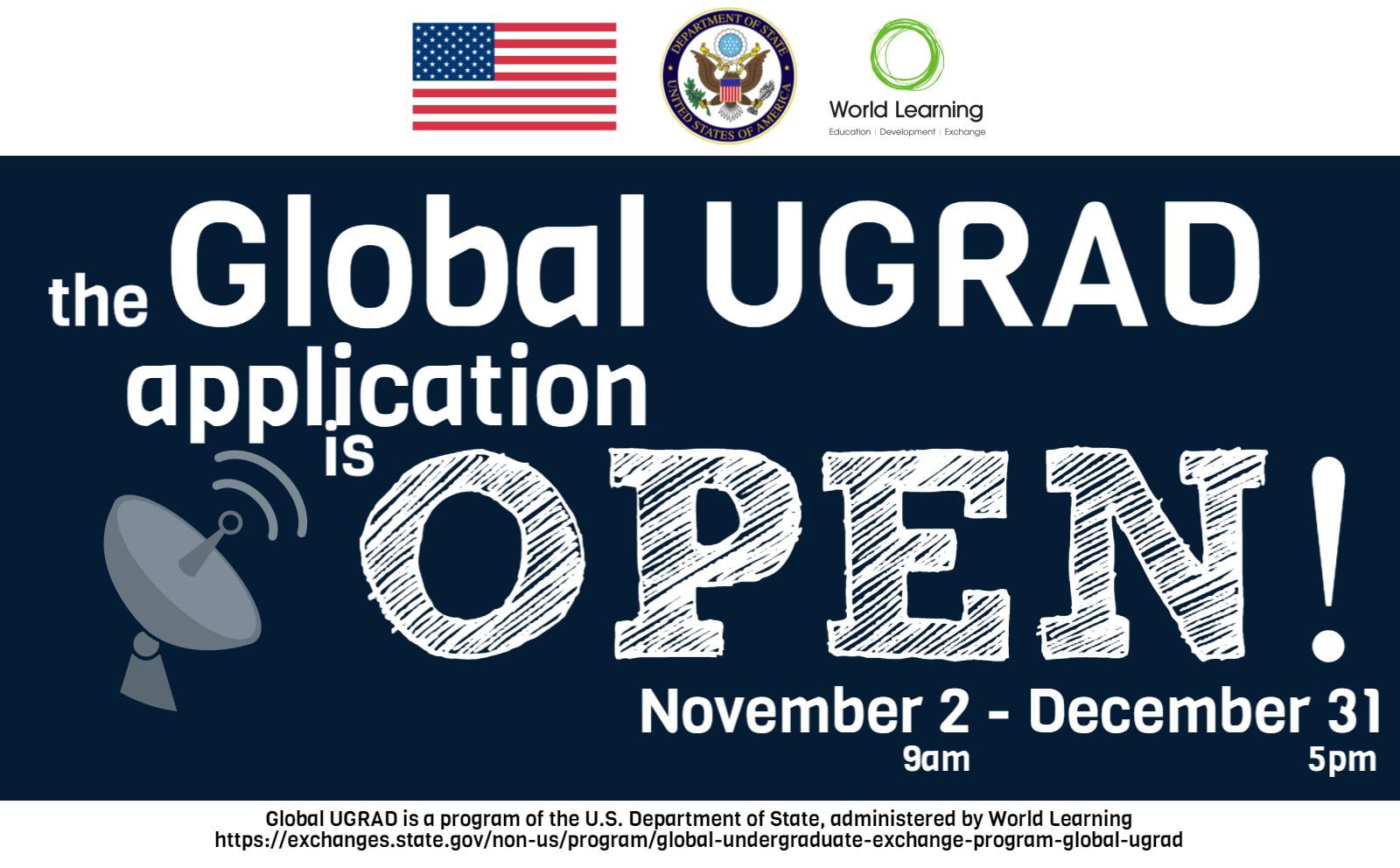Global UGRAD World Learning Exchange Program

The Global Undergraduate Exchange Program (Global UGRAD) brings future leaders to the U.S. to experience the U.S. educational system, share their culture, and explore U.S. culture and values.
Global UGRAD is administered by World Learning on behalf of the U.S. Department of State’s Bureau of Educational and Cultural Affairs.
Global UGRAD provides one semester scholarships to outstanding undergraduate students from around the world for non-degree full-time study combined with community service, professional development, and cultural enrichment.
Since 2008, World Learning has provided this opportunity to approximately 2,000 Global UGRAD students. Participants leave the U.S. with the tools to become leaders in their professions and communities. Global UGRAD alumni go on to receive Fulbright grants, obtain prestigious international internships, and work in business and government in their home countries.
Program Goals
- To promote mutual understanding between people of the United States and other countries.
- Provide a fulfilling exchange experience to drive academic, cross-cultural, and leadership competencies for students from Global UGRAD countries.
- Enhance students’ academic knowledge and professional skills needed to pursue long-term academic and career goals.
- Cultivate students’ comprehensive and nuanced understanding of the U.S.
- Facilitate opportunities for students to establish social networks with U.S. host institutions and local communities.
- Empower students to engage constructively in the civic life of their local and global communities.
Program Eligibility
Global UGRAD is open to all academic fields of study and does not discriminate on the basis of race, color, gender, sexual orientation, religion, ethnicity, or disability. Competition for the program is highly competitive and merit based. Finalists will be selected on the basis of academic excellence, leadership potential, and their preparedness for study in the U.S.
The Global UGRAD Program is open to anyone who is/has:
- over 18 years of age;
- a citizen of a Global UGRAD participating country*, currently residing in that country;
- enrolled as an undergraduate in good standing at any accredited university, public or private, and has at least
- one semester remaining at their home university at the conclusion of the Global UGRAD program;
- completed secondary education in their home country;
- a solid command of written and spoken English (English Language training for some finalists is possible);
able to begin studies in the U.S. in August 2018 or January 2019 (selected participants may not defer to a later date); - eligible to receive and maintain the U.S. student exchange visa (J-1) required for the program;
- cleared by a physician to participate in the program;
- committed to returning to their home country after the completion of the program.
Individuals in the following circumstances are not eligible for the Global UGRAD Program:
- U.S. citizens and permanent residents of the U.S.;
- Individuals currently studying, residing, or working outside of their home country;
- Local employees of the U.S. missions abroad who work for the U.S. Department of State and/or the U.S.
- Agency for International Development (USAID); employees are also ineligible for one year following the termination of employment;
- Immediate family members (i.e. spouses and children) of U.S. Department of State and USAID employees; family members are also ineligible for one year following the termination of employment;
- Current World Learning employees and their immediate family members
Participating countries/locales include: Algeria, Albania, Armenia, Azerbaijan, Bahrain, Bangladesh, Belarus, Bosnia-Herzegovina, Burma (Myanmar), Cambodia, China, Costa Rica, Dominican Republic, Egypt, El Salvador, Georgia, Guatemala, Haiti, Honduras, India, Indonesia, Israel, Jordan, Kazakhstan, Kenya, Kosovo, Kuwait, Kyrgyzstan, Laos, Lebanon, Macedonia, Malawi, Malaysia, Maldives, Mauritania, Moldova, Mongolia, Montenegro, Morocco, Mozambique, Nepal, Nicaragua, Niger, Oman, Palestinian Territories, Panama, Paraguay, Philippines, Russia, Saudi Arabia, Serbia, South Korea, Sri Lanka, Tajikistan, Thailand, Turkmenistan, Ukraine, Uzbekistan, Venezuela, Vietnam, and Zimbabwe.
For more information click here.



